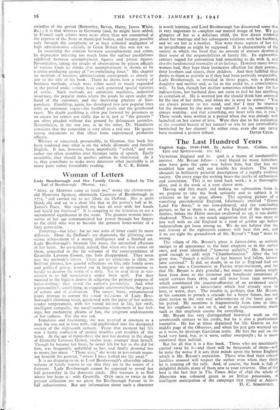Woman of Letters
Lady Bessborough and Her Family Circle. Edited by The Earl of Bessborough. (Murray. 15s.)
" MME. DE MERt'OIS came to fetch me," wrote the eleven-year- old Henrietta Spencer, afterwards Countess of Bessborough in 1772, " and carried me to see Mme. du Deffand. She is quite blind, old and sat in a chair like that in the porter's hall at St. James's Place. She touched my face all over with her hands and kiss'd my forehead." It is tempting to the historian to see a sacramental significance in the scene. The greatest woman letter- writer of her age communicated her power through her fingers to the child who was to become the greatest letter-writer of a later generation.
Tempting—but false: for no two sorts of letter could be more different. Mme. du Deffand's are diamonds, the glittering con- scious achievement of a strong intelligence and a finished art. Lady Bessborough's blossom like roses, the unstudied effusions of her heart. So unstudied, indeed, that when one first comes on them, concealed in the fat volumes of the correspondence of Granville Leveson Gower, one feels disappointed. They seem just like anybody's letters. There are no witticisms in them, no brilliant phrases, few general reflections on life; only family news and political gossip, poured out in language so spontaneous as hardly to deserve the name of a style. Yet to read three in suc- cession is to fall irretrievably under their spell. For they succeed in the highest degree in achieving the primary purpose of letter-writing : they reveal the author's personality. And what a personality !—combining, in exquisite unexpectedness, the graces of nature and of civilisation. The casual, hasty, unpunctuated pages manage to convey the actual inEtexions of Lady Bess- borough's charming voice, quickened with the pulse of her ardent, tender temperament, with her varied interest in life, her swift, intelligent sympathy, the unself-conscious refinement of her feel- ings, her enchanting gleams of fun, the poignant undercurrent of her sadness. For she was sad.
Impulsive and fascinating, she was married at nineteen to a man she was not in love with, end pitchforked into the dissipated society of the eighteenth century. From that moment her life was a hectic confusion of money troubles and troubles of the heart. At the age of thirty-three she met her destiny in the shape of Granville Leveson Gower, twelve year:; younger than herself. Though he became her lover, he never felt for her as she did for him, was frequently unfaithful to her, and finally deserted her to marrysher niece. " Those eyes," she wrote in passionate yearn- ing beneath his portrait, " where I have looked my life away."
It is no disparagem ..nt to Lord Bessborough's admirably edited volume of family papers to say that they are in the nature of a footnote. Lady Bessborough cannot be expected to reveal her full personality in the domestic circle. Her treasure is to find where her heart is : with Granville. Only once or twice in the present collection are we given the Bessborough flavour in its full seductiveness. But any information about such a character is worth learning, and Lord Bessborough has discovered some that is very important to complete our mental image of her. We get glimpses of her as a delicious child, the first direct evidence about her marriage and her subsequent relations with her husband, and we see her as a mother. Nor were those aspects of her life as insignificant as might be supposed. It is characteristic of the society in which she lived that no amount of amours destroyed their sense of the responsibilities of family life. Its eighteenth. century regard for convention had something to do with it, and also the fundamental normality of its feelings. However many lovers women had, they kept their instinctive affection for their parents, their brothers and sisters, their children. And they fulfilled their duties to them as actively as if they had been perfectly respectable. Lady Bessborough, as revealed in these pages, was a devoted daughter and mother and, as far as she could be, a conscientious wife. In fact, though her mother sometimes rebukes her for her indiscretions, her husband does not seem to feel he has anything to complain of. He is worried lest she should think him annoyed by the size of her debts, and when she is away he writes: " You are always present to my mind, and tho' I may be stunned for the moment by the noise and tumult I am in, something is always wanting : and that something, my heart tells me, is you." These words were written at a period when she was already well launched on her career of love. Were they due to his realisation of the essential beauty of her nature? or was he just irremediably bewitched by her charm? In either case, even she can never






























 Previous page
Previous page